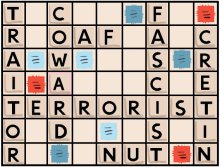 Common techniques > Word games Name calling Previous | Next | Index  |
|
"Bad names have played a tremendously powerful role in the history of the world and in our own individual development. They have ruined reputations, stirred men and women to outstanding accomplishments, sent others to prison cells, and made men mad enough to enter battle and slaughter their fellowmen. They have been and are applied to other people, groups, gangs, tribes, colleges, political parties, neighborhoods, states, sections of the country, nations, and races." (Institute for Propaganda Analysis, 1938)
The name-calling technique links a person, or idea, to a negative symbol. The propagandist who uses this technique hopes that the audience will reject the person or the idea on the basis of the negative symbol, instead of looking at the available evidence. The most obvious type of name calling involves bad names. For example, consider the following:
|
| Comments to author: [email protected] |